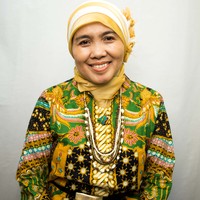Etin Anwar
Hobart & William Smith Colleges, Religious Studies, Faculty Member
- Etin Anwar serves as the Chair of Religious Studies at Hobart and William Smith Colleges, Geneva, New York. She is th... moreEtin Anwar serves as the Chair of Religious Studies at Hobart and William Smith Colleges, Geneva, New York. She is the author of Gender and self in Islam (Routledge, 2006) and has published several articles on Ibn Sina, Meister Eckhart, Ibn Arabi, and women’s movements in Indonesia in various journals.edit
This is an introduction to the issue of gender and self in Bahasa Indonesia. The book is the Bahasa's edition of Gender and Self in Islam
Research Interests:
The paper discusses the theological issues around the issue of women's leadership in prayer (imamat al-mar'a) or lack thereof and Muslim women's responses toward it within the contexts of Indonesian Islam.
Research Interests:
The book discusses gender construct and its impact on the constitution of the self in Islamic tradition. Using Islamic philosophy as a method, it explores the roots and contexts of ontological, generative, material, performative and... more
The book discusses gender construct and its impact on the constitution of the self in Islamic tradition. Using Islamic philosophy as a method, it explores the roots and contexts of ontological, generative, material, performative and spiritual self and its embodiment in gendered hierarchical systems.
Research Interests:
viii, 194 hal.; 24 cm
Research Interests:
Research Interests:
Dedication Acknowledgment Copyright Acknowledgment Editor's Introduction Author's Introduction I. The Politics of the Human Body II. The Politics of Sexuality III. The Politics of Gender IV. The Politics of Citizenship V. The... more
Dedication Acknowledgment Copyright Acknowledgment Editor's Introduction Author's Introduction I. The Politics of the Human Body II. The Politics of Sexuality III. The Politics of Gender IV. The Politics of Citizenship V. The Politics of Population Conclusion Index
Research Interests:
Research Interests:
Research Interests:
Research Interests:
Research Interests:
The paper deals with the concept of wasaṭīyah (moderation) as an ethical framework for community making and its impact on the pursuit of gender equality. Qur’an 2:143 speaks about the correlation between making a fair community (al-ummah... more
The paper deals with the concept of wasaṭīyah (moderation) as an ethical framework for community making and its impact on the pursuit of gender equality. Qur’an 2:143 speaks about the correlation between making a fair community (al-ummah al-wasaṭ) and piety, which is inclusive of both men and women. As both terms are intertwined, any efforts to discuss wasaṭīyah must include how Muslims relate to God and how this relationship is exercised in all areas of their lives. Given that this intersection is a matter of ethics, my paper will demonstrate that wasaṭīyah affords the inclusion of both genders as ethical agents in the pursuit of a fair community. I first discuss how the ethics of wasaṭīyah provide a framework for community building by drawing some parallels between Prophet Muhammad’s creation of a fair and inclusive community and how Muslims could embody God’s message within themselves and their communities. I then show how including women in the community-making process echoes bo...
Research Interests:
Research Interests:
... Pinar Bilgin 6 7 Turkey's Kurds A theoretical analysis of the PKK and Abdullah Ocalan Ali Kemal Özcan 8 Beyond the Arab Disease New perspectives in politics and culture Riad Nourallah 9 The Arab Diaspora... more
... Pinar Bilgin 6 7 Turkey's Kurds A theoretical analysis of the PKK and Abdullah Ocalan Ali Kemal Özcan 8 Beyond the Arab Disease New perspectives in politics and culture Riad Nourallah 9 The Arab Diaspora Voices of an anguished scream Zahia Smail Salhi and Ian Richard ...
Research Interests:
Research Interests:
Research Interests:
This paper examines the use of social, religious and cultural heritage for community building and mosque participation by Indonesian Muslim communities in New York City and its impact on women’s leadership in al-Hikmah mosque and their... more
This paper examines the use of social, religious and cultural heritage for community building and mosque participation by Indonesian Muslim communities in New York City and its impact on women’s leadership in al-Hikmah mosque and their production of moral agency and pious self in the mosque setting. I argue that Indonesian Muslim women in AI-Hikmah mosque has more leadership capacity due to the cultural heritage of Indonesian Islam and the complementary status of women in their communities. In this paper, I will, first, discuss how the cultural heritage of a mosque along with its patriarchal, masculine leadership influences women's treatment. I will, secondly, examine how female authority is produced within the enmeshed patriarchal leadership, the heritage of Indonesian values. and masculine mosque cultures. In particular, I will discuss how women's religious and social activities generate empirical characters that shape the performance of female moral agency and the cultiva...
